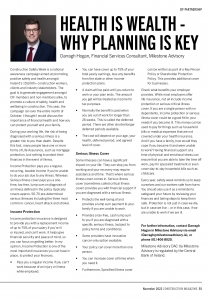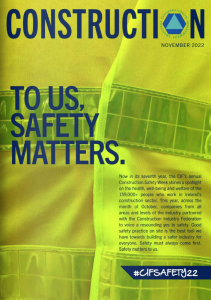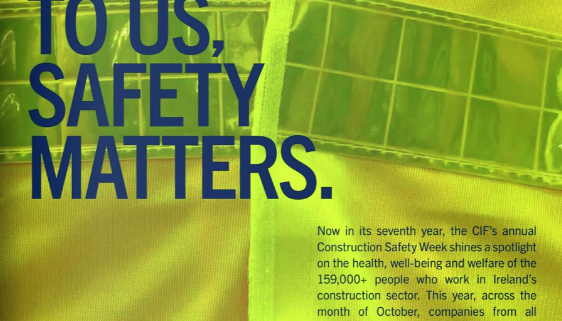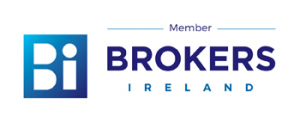Why financial health planning is key to a secure future
 The CIF Construction Safety Week is an annual campaign to re-focus the attention of Ireland’s 159,000+ construction workers and industry stakeholders alike. While the themes may vary from year to year, the mainstay of the campaign is centred around health and safety of every single person working in and around the construction industry. Ultimately, it’s an opportunity to promote a culture of safety, health, and wellbeing in the construction sector. Based on this years’ campaign in October 2022, I thought it pertinent to discuss the importance of financial health and how this protects you and your family.
The CIF Construction Safety Week is an annual campaign to re-focus the attention of Ireland’s 159,000+ construction workers and industry stakeholders alike. While the themes may vary from year to year, the mainstay of the campaign is centred around health and safety of every single person working in and around the construction industry. Ultimately, it’s an opportunity to promote a culture of safety, health, and wellbeing in the construction sector. Based on this years’ campaign in October 2022, I thought it pertinent to discuss the importance of financial health and how this protects you and your family.
Many of us think that death is the ultimate threat to the future of our family’s financial security (especially if there is only one breadwinner of the household). However, during your working life, the risk of being diagnosed with a serious illness is a greater risk to you than death. This can impact your ability to work (and impact your earning power) for months, years and in some tragic cases, permanently.
When people consider protection products, they generally purchase one or more forms of Life Assurance, such as Mortgage Protection. This is a great product to have but does nothing to protect finances in the event of illness.
Life and Death, or Illness?
Unlike Life Assurance, Income Protection pays you a regular, recurring, taxable income if you are unable to work due to any illness. This will continue to be paid until you are fit to return to work, or you reach the end of your policy term. Serious Illness cover, on the other hand pays you a once off, tax-free, lump sum on diagnosis of an illness defined in the policy (typically covers approximately 50-70 pre-determined serious illnesses including the three most common: cancer, heart attack and stroke).
Income Protection
Income protection insurance is designed to provide you with a replacement income of up to 75% of your salary if you’re ill or injured and can’t work. It helps give financial security and peace of mind, so you can focus on getting better. In my opinion, Income Protection is one of the most important insurances you can have in place, to protect your financial future.
What is included?
- Pays you a regular income if you can’t work because of an injury or illness while employed.
- You can have cover up to 75% of your total yearly earnings, less any benefits from the state or other income protection plans.
- A claim will be paid until you return to work, or you reach the end of your policy term. The amount you get will be treated as income for tax purposes.
- Normally the benefit is paid when you are out of work for longer than 26 weeks. This is called the deferred period. Deferred periods can vary, so it is worth discussing this while designing your policy.
- The cost will depend on your age, your health, deferred period, and agreed level of cover.
Serious Illness Cover
Some illnesses can have a significant, long-term impact on your life. They can stop you from working and your recovery may require assistance and an extended amount of time. That’s where Serious Illness cover is vital. This cover (sometimes called Critical Illness cover) provides financial support if you are diagnosed with a serious illness.
 What is included?
What is included?
- Protects the well-being of and provides a lump sum payment to your family if you are unable to work.
- Provides a tax-free, cash lump sum to you if you are diagnosed with a specific serious illness (subject to policy terms and conditions).
- Some providers have innovative cancer-only option available.
- Your policy can cover more than one person.
- You can increase cover at times when you need it.
- Furthermore, Specified Illness cover can be written as part of a Key Person Policy or Shareholder Protection Policy. This provides additional cover for businesses.
Additional Considerations
Before considering what type of protection you might require; it is worth asking your employer if they have a scheme with benefits in place. While most employers offer Life Insurance, not all include Income Protection or Serious Critical Illness cover.
As a single person with no dependents, Income Protection or Serious Illness cover could be a good fit for your needs if you become ill. This money can be used to pay for things such as household bills or medical expenses that are not covered under your health insurance policy.
If you have additional responsibilities such as a family, how would they cope if you became ill and were unable to work? Having financial support at a time of physical and emotional stress can ensure that you are able to take the time off work, pay for specialist treatment or even cover day-to-day household bills such as childcare or nursing home fees.
The CIF Safety Week campaign is a great annual reminder to be more mindful of our health, our futures and preparing for the unexpected. We might be biased, but we encourage our clients within the construction industry to use this time to review their finances and thereby safeguarding their future.
Protection is not just in case we die, but in case we live – or in this case if we are unable to work if we are ill.
 Here to help you navigate your way to financial security.
Here to help you navigate your way to financial security.
The Milestone Advisory team are qualified financial services consultants. We specialise in helping professionals in the construction sector and related industries. Our team will work with you to review your finances, explaining your options in clear English.
No jargon – just the facts.
For further information please contact Darragh Hogan by email or phone: (01) 406 8020.
Milestone Advisory DAC t/a Milestone Advisory is regulated by the Central Bank of Ireland.
Warning: The value of your investment may go down as well as up.





